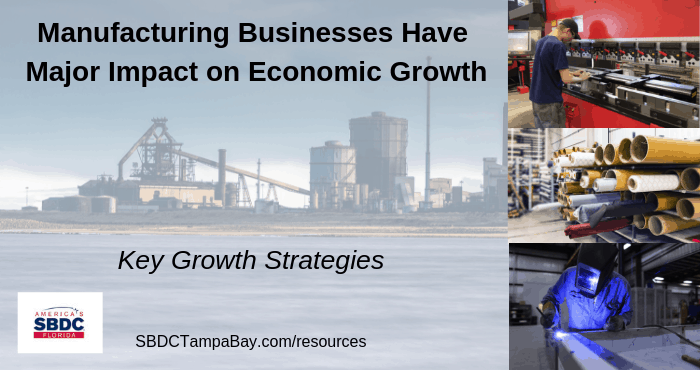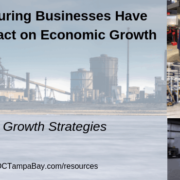Manufacturing Businesses Have Major Impact on Economic Growth
by Pablo Arroyo | September 26, 2018
A manufacturing business, as any other type of business, faces many challenges in today’s competitive marketplace. In particular, there are unique characteristics of a manufacturing operation that sets it apart from other businesses. Operations that are involved in the production and distribution of goods typically have a higher requirement of capital, higher need for labor, need to carry inventory and are dependent upon their role in the value chain in which they belong.
Over time, we have seen the power in the supply chain shifting to the retailer, which dictates conditions for supplying a product and sets the price. In addition, manufacturers face changing consumer trends which implicate product re-design and adaptation and also changing industry trends which translate into new methods and processes for the production of goods.
All these unique challenges have exerted more pressure on the manufacturer, who needs to deal with and adapt to these changes.
Manufacturing activities have a tremendous impact on the U.S. economy and represent a major driver for economic growth. According to the National Association of Manufacturers, U.S. manufacturers contributed $2.33 trillion to the U.S. economy in the first quarter of 2018. This includes both durable goods such as cars, appliances and electronics and non-durable goods or consumables.
Most manufacturing firms in the U.S. are small, having fewer than 500 employees, but generate a multiplier effect greater in magnitude than any other sector. This is because manufacturers are part of a value chain where each player adds value to what becomes a finished product to the final consumer. A manufacturer can be part of several industries’ supply chains such as food, automotive or construction. Manufacturing also has a multiplier effect as logistics, transportation and warehousing services are needed.
In Florida, manufacturing has a significant impact on the state’s economy. The Florida Chamber of Commerce estimates that manufacturing contributes more than $40 billion to the state’s economy and accounts for 330,000 jobs with wages higher than in other sectors. Florida’s unique geographical location in the Southeastern U.S. and at the crossroads of the Caribbean and Latin America has positioned it as a major hub for the exporting of manufactured goods.
Florida also lies along major international shipping routes for hemispheric trade with Europe. It is clear why Florida’s manufacturing is an engine supplying most of the goods being shipped globally. The International Trade Administration reports that almost 60 percent of these goods are produced by Florida’s small and medium size enterprises.
In the Tampa Bay area, manufacturing has imprinted a legacy in the area. The origins of the city date back to the late 1800s with the establishment of cigar factories where Cuban and Spanish immigrants made high quality, artisan-style cigars. The existence of a port also made it possible to ship cattle and citrus to world markets. The Tampa Economic Development Corporation explains that the region represents the second largest base of manufacturing employment in Florida with more than 2,800 manufacturers. These businesses are involved in the advanced manufacturing of a wide range of products within the biomedical, aviation, information technology, chemical, petroleum and food sectors. A deep-water port, rail network and an international airport augment distributions and logistics operations in the area.
With all of this in perspective, we can pose the following questions: What is the future of manufacturing? What challenges lie ahead for these businesses? How can manufacturers prepare themselves to deal with these challenges effectively? Where can manufacturers find assistance to tackle all of these?
Check back next week to find the answers needed.







Pablo Arroyo, MBA, CGBP, CME
Arroyo, Consultants, International Consultants 2, International Trade, TampaNASBITE Certified Global Business Professional (CGBP), Florida SBDC at USF, Tampa
Specialties: International Trade, Marketing, Business Planning, Startup Assistance
Pablo Arroyo has 17 years of experience in business development as an owner and business consultant in the public and private sectors. He is a Certified Global Business Professional (CGBP) and a Certified Marketing Executive (CME). He holds a bachelor’s degree in animal science, concentrating on international agriculture and agriculture economics, from the University of Missouri, and an MBA from the University of South Florida in marketing and international business. Arroyo was involved in strategic market expansion for companies from diverse sectors with emphasis on manufacturing, technology, agribusiness, food, tourism, hospitality, entrepreneurship and value-added enterprise development. Originally from Puerto Rico, he is fluent in Spanish and English.